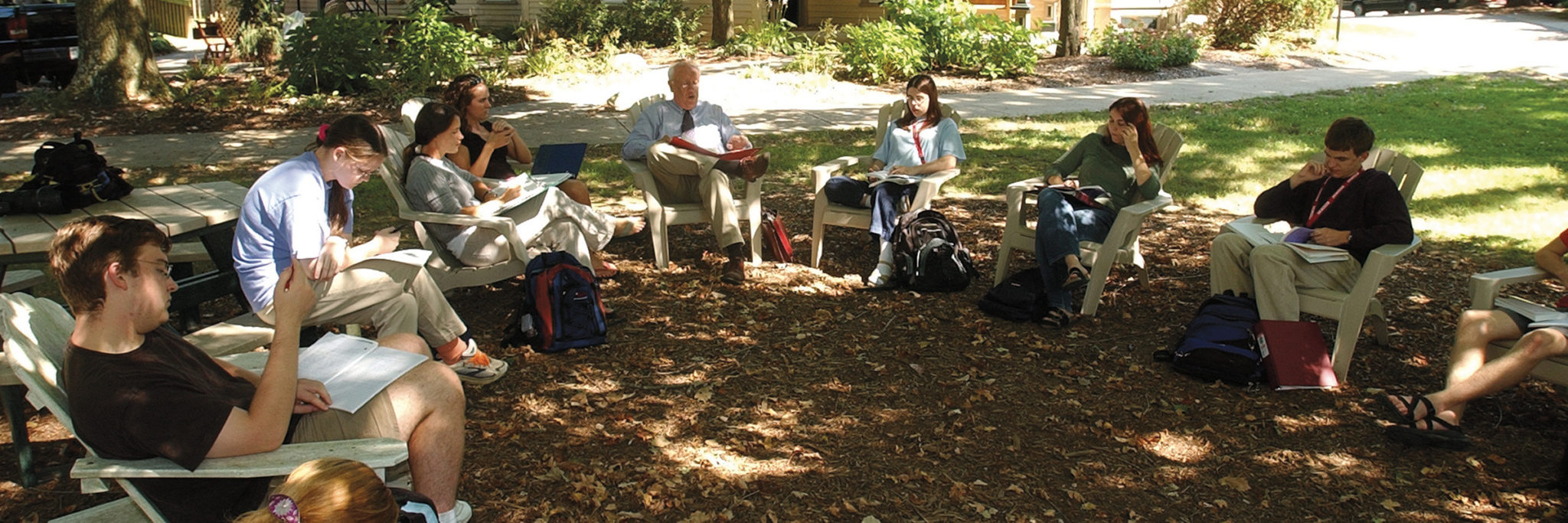Fulbrights, summer research on African immigration to Spain, and a student-led course on tattooing around the world all stem from the same place in the Gilpatrick House. Margot Singer, associate professor of English and director of the Lisska Center for Scholarly Engagement at Gilpatrick House, discusses the ways in which the Lisska Center is continuing Denison’s culture of mentorship—and honoring the former Honors Program. —Sheila Haar Siegel
The Lisska Center’s roots have always been grounded in student scholarships, fellowships, and research programs. Tell us about those beginnings.
Professor Tony Lisska founded Denison’s Honors Program, the precursor to today’s Lisska Center. After the Honors Program phased out in 2008, we took on the oversight of the Summer Scholars Program and continued our advisory role in helping students apply for fellowships. Then, in 2015, President Adam Weinberg asked if we would put a group of faculty together to think about revitalizing the then—Gilpatrick Center as a hub for intellectual life and scholarly pursuits on campus.
What does the Center do today?
We’ve created a stronger, single point of contact for advising, programming, funding, advocacy, and leadership in relation to intellectual life on campus. We’ve continued the fellowship work that Tony started, and we’ve expanded the Summer Scholars Program. We’ve sponsored an expanded array of intellectual enrichment programming. And we’re coordinating with other campus offices, including off-campus study and the Knowlton Center for Career Exploration.
What are some examples of the Center’s expanded activities?
One is that we’re working with Denison’s corporate and foundation grants officer to support faculty members who are seeking outside scholarships and funding. Another is programming. We added a program called Monday Musings, where we invite faculty members to give informal talks in the Gilpatrick House lounge on scholarly interests, research, or creative work. We started a program called Research Tables, in which faculty members get funding to explore multidisciplinary topics, such as “Ethics in Cyberspace.”
The Experimental College is being revived. Students can propose, present, and teach minicourses on topics not covered in the regular course catalog. “Tattooing Around the World,” led by Sophia Higginbottam ’17, was really popular last year.
There are also a lot of opportunities for students to apply for funding to support individually designed projects. A good example is the Davis Projects for Peace, which is a nationally competitive fellowship of $10,000 grants for summer projects that promote world peace in a broad way. Every year that we’ve been part of it, we’ve had at least one winner. This past year, Mrinalini Mitra ’21, then a first-year student from India, won for her project—purchasing inexpensive solar-powered devices for Indian villages that have no electricity.
What kinds of students are making use of the Center?
When it was the Honors Program, there was the perception that only students with a 4.0 average were able to participate. I’m not sure that was ever true, but it’s definitely not true anymore. There are opportunities for all kinds of students. Even Fulbright awards, which are very prestigious and competitive, do not have a GPA cutoff. The vast majority of the students we work with are simply ambitious and motivated. We hope all students will come to the Lisska Center and meet with us to explore the opportunities that are out there.

